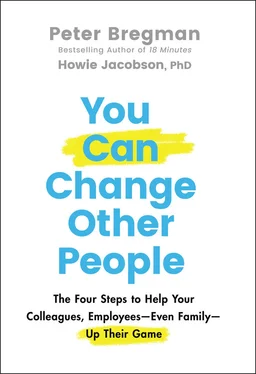Remember my son Daniel who bought and built his own gaming computer? He owned the entire process. He wanted the computer; I didn't want it for him. He enlisted help—from his grandfather, aunt, cousin, and even me at times—to take the necessary steps in the process. He didn't take shortcuts. He put up with frustration, confusion, and fear without giving up.
That's what ownership looks like.
When you solve problems for others, you take away their ownership of those solutions. Even if your advice is perfect—which, by the way, is almost never the case—it's useless if it won't be used.
If you really want to change someone, get them to create the plan. Get them to defend it. They'll be much more likely to implement a suboptimal plan of their creation and choosing than the perfect plan that you create. And if their initial plan fails? You'll be in a position to help them brainstorm a different approach because they'll see you as an ally, rather than a critic.
Personal ownership is one important power of change. Another, as we're about to see, is independent capability.
1 1A note about the fictional names for the composite characters in this book: I've tried to be inclusive and avoid gender, cultural, and racial stereotyping. If any of the names or pronouns rub you the wrong way, feel free to change them.
CHAPTER 4 POWER 2: INDEPENDENT CAPABILITY: SPENCER THINKS HE'S HELPING, BUT HE'S NOT
So, Spencer rejected Octavia's report and replaced it with his own design, which she had to update each week, momentarily solving his problem but robbing her of ownership and creating a tense relationship between them.
Let's consider a completely different way this could have played out.
Suppose Spencer had directed Octavia to create the report, but instead of spending her weekend putting together the wrong thing, Octavia had simply asked him what it should look like.
In that case, would it have been fine for Spencer to design the spreadsheet for her? That way, Octavia would not have wasted her weekend, Spencer would not have had to critique her poorly conceived, overly detailed report, and Octavia would not be left feeling resentful.
This scenario would be tempting for both of them. Octavia, of course, might be happy and relieved because she gets a quick answer and now can fill out the spreadsheet (or have someone else fill it out mindlessly) in full confidence that she's providing exactly the right information. And Spencer would be happy too: He gets the crucial data he wants in the brief format he prefers. He also gets to feel helpful and smart, qualities that won him the CEO post in the first place. And he receives positive feedback from Octavia, who is both impressed with his competence and grateful for his assistance. It's a win-win!
Or is it?
While Octavia is now compiling a report that meets Spencer's expectations, she hasn't changed. She's no more strategic or proactive than before. She's no more discerning about the problem and potential solutions. And when you think about the underlying problem—an underperforming Marketing Department—what's going to make a bigger difference: Octavia's ability to input numbers into spreadsheet cells or her ability to think strategically and act proactively in the marketplace? Spencer missed a crucial opportunity to raise the performance of a department.
A person undergoing real, lasting change must become independently capable so they aren't in constant need of someone else in order to follow through.
At one level, that's so obvious, I might not need to mention it. If I can't create a spreadsheet, then I won't be able to create a spreadsheet. But we're not just talking about a spreadsheet here. Spreadsheets don't solve problems; people do. We're talking about thinking strategically in order to solve a problem.
I'd argue that the real opportunity for change here is for Octavia to understand the revenue problem they're facing, understand how Marketing's poor lead generation is contributing to it, and most important, own it and be able to turn it around.
In other words, Spencer's real prize here isn't a great spreadsheet, it's a marketing leader who is able to bring about sustainable growth in sales and profits.
By relying on Spencer to create the spreadsheet, Octavia doesn't have to grow. She doesn't have to become more strategic, or more thoughtful, or a better problem solver. She doesn't even need to become a better marketer.
Which means that every time the business needs support from Marketing, someone—probably Spencer—will have to shoulder the burden that Octavia is unable to carry. Octavia remains an order taker, not a thoughtful, insightful problem-solving partner.
Being helpful can be a wonderful trait in a manager or colleague—even a family member. And there are times when it's appropriate (if I can't figure out how to unmute myself in a Zoom meeting, and you tell me to click on the microphone icon in the lower left of my screen, that's great).
But if someone comes to you with a recurring problem or one that requires their thinking and judgment, then giving them the answer or doing it for them will function as a crutch. You will have missed an opportunity to build their independent capability. And the next time they have a similar problem, they'll just come to you again, because they haven't learned how to solve it. They haven't changed. You will be stuck doing their work and they will be stuck at a lower level of performance.
That's the outcome Spencer got when he spent 30 minutes creating the new spreadsheet. What he should have done instead is grow Octavia's capacity to act more powerfully and successfully in the future.
Ownership and capability are essential to making that happen. But there's more. Even if someone you're helping has ownership and capability, change is emotionally difficult. Your partner will need the power of emotional courage to learn unfamiliar and uncomfortable new behaviors. We'll explore this in the next chapter.
CHAPTER 5 POWER 3: EMOTIONAL COURAGE: IF YOU ARE WILLING TO FEEL EVERYTHING, YOU CAN DO ANYTHING
What if, instead of criticizing her spreadsheet or redoing it, Spencer sat down with Octavia to help her grow her ownership of the problem and increase her capability to solve it?
Are they done?
Not so fast. There's something missing. A challenge that is rarely addressed yet causes many failed change attempts: the massive gap between knowing what to do and actually doing it.
Change is hard. And admitting that you need to change can be very hard. Facing colleagues and asking for their help in changing can be extremely hard. And struggling to develop new skills can be downright terrifying, especially when you have to give up old familiar patterns without yet having developed new ones to replace them.
Octavia needs the courage to feel all those uncomfortable feelings, even as she acts in ways that trigger and intensify them.
Think for a moment about a conversation you know you should have with someone, yet haven't. Is there an issue you're reluctant to share with a partner? A conflict at work that you're not addressing? Subpar performance from someone you're responsible for?
Why haven't you had that conversation yet?
Is it because you're not motivated? Because you just don't care enough to bother? I doubt it. The very fact that it's on your mind indicates that you can feel its importance.
Is it because you don't have the knowledge or skills to have the conversation? You don't know what to say? How to say it? I'd bet you know exactly what you want to say and I'm sure you're skilled enough to say it. In fact, I imagine you've been thinking about it over the course of some time. Sure, you could tweak the words, maybe make them more elegant, but you know what you need to convey.
Читать дальше












